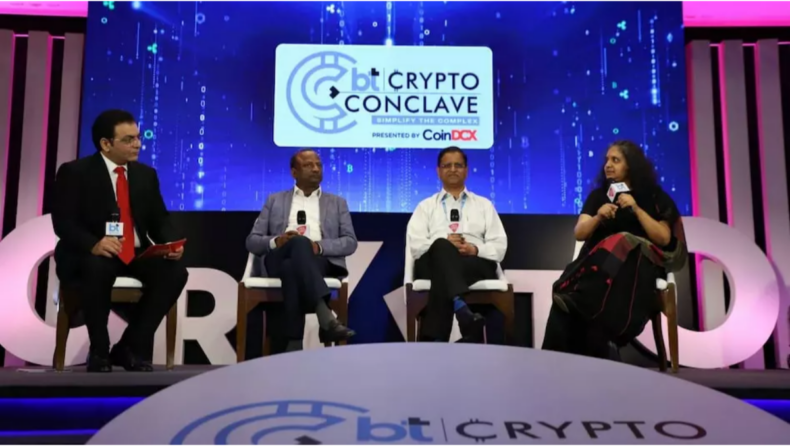It was the first Business Today Crypto Conclave, and Kunal Nandwani, the co-founder of uTrade Solutions, Deepak Bagla, MD and CEO of Invest India, Nikhil Chinappa, co-founder of OxdotTV, and R Vivekanand, global head of BSFI Platforms and Products at Tata Consultancy Services (Virtual), were all there. They talked about Blockchain and Crypto: The Fintech Revolution, which was about the future of finance.
The panellists spoke at length about the products that need to emerge in places that are not only regulatory safe but also add value when discussing the future of this business and where it is headed. Chinappa started began the conversation by stating that he believes Web 3 is the way of the future.
“What we’re looking at in Web 3 is identification, a series or collection of wallets,” Chinappa said, adding that all of our assets – identity, the house or car you own, and so on – will all be stored somewhere.
“Like your identity is stored in your passport or Aadhar card, your land records are kept by the municipal corporation, and so on, the only way to provide authenticity and transparency to all of these parts of life is to place it all on the blockchain.
” You can’t replicate or cheat it, and you can utilize it to figure out what each individual does,” Chinappa explained. “Wallets are the future of all of us; how we communicate with each other, send money, and exchange trust will all happen between wallets,” he continued.
While Chinappa was optimistic about Web 3 and the future, Nandwani said he was “cautiously optimistic” about the space, but that cryptos and blockchain have “certainly offered a new way of looking at the world,” such as how it has created a parallel financial system in the form of crypto, as well as developed a decentralized mechanism for incentivizing people to form communities, and so on.
He presented Wikipedia as an example of a pre-crypto decentralised community, in which no one owns Wikipedia and everyone can contribute, curate, and consume content.
“Imagine if Wikicoins were introduced, rewarding individuals to produce and consume content in the same way that Bitcoin does,” Nandwani said. “It’s given the community a tokenized type of incentive on top of the goodwill that previously existed.”
He went on to say, “Every single token out there has a CEO.” “They may not have a finite number of resources, but they all face challenges.”
“By definition, blockchain is slow; it is inefficient because it slows things down,” Nandwani remarked. Imagine arranging an event like this and asking every single person present, every single time, for their preferences, rather than one person making a split-second decision, he said, adding that blockchain only works when workflows and decision-making are decentralised.
“In a centralised setting, a decentralised technology will not work.” Whether it’s NFT, Web 3, or the Metaverse, the instant a company has a CEO, it’s centralization by definition. “It’s like North Korea declaring democracy tomorrow and making the leader the sole voter,” Nandwani said.
According to him, we must comprehend and question whether decentralization is truly taking hold, if participation is truly egalitarian for all community members, or if the odds are stacked in favour of a few wallets that hold 80 to 90% of the world’s Bitcoins.
“The concept of decentralization is enticing, but we haven’t yet built communities to achieve certain goals.” We must plan ahead of time rather than relying on the tip of the iceberg. Nandwani said, “We need to scratch a little more.”
“There is a utility in what is being presented here. For example, if I can digitise all the land records and put them in a blockchain from my perspective, the Invest India perspective, I think of the impact on the ease of doing business.
It will change the complete format and the challenges which we are working on and more so when we are talking of the MSMEs. So, from that perspective, when I said that it is already a utility which has a momentum, which is backing it,” Bagla said.
“Us, living in a society, which has one of the highest rates of adoption and adaption to technology, to my mind. I think that is the biggest inherent strength of India as we move into the next generation. But we are at a very critical inflexion point in our history of modern India.
Never before have been at this inflexion point and this inflexion point has been driven both by digitisation and the adaption and adoption of that digitization and blockchain is just an aspect of it,” he added.
Speaking about the “brain drain” in the crypto space and why most youngsters are looking at foreign pastures for their ventures, Nandwani pointed out that a lot of things we are trying to put on the blockchain now were functioning quite fine without it too.
“Blockchain is a sort of a hammer we have found and now we are looking for nails to put blockchains to it,” he said.
“I’d like to see the problem we’re attempting to fix.” We can all agree that digitalization is the problem. We should digitize since there is a digitalization problem. Is blockchain, however, the only technology that exists? I’m inclined to disagree.
Many databases have existed in the past, including Sequel, Oracle, and others. There weren’t as many conferences on them as there were on the blockchain,” Nandwani said, adding that if blockchain can solve a problem, wonderful, but if it doesn’t, other technologies can.
“We’ve been debating crypto law in India for years. We have yet to receive any responses. There is some clarity on taxes, but it is still hardly bearable. It has become prohibitive in several aspects. There’s also a problem with the lack of clarity surrounding crypto asset ownership.
Published By :- Tarsem Singh
Edited By :- Khushi Thakur













